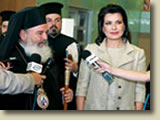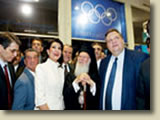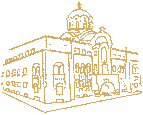| Information
Service of
the Serbian Orthodox Church
Avgust 12, 2004

DETERMINING AND INTEGRATING KOSOVO AND METOHIJA:
ETHNICITY, RELIGION AND CITIZENSHIP AS CAUSAL FACTORS
 Fr Irinej Dobrijevic, consultant on International and Interchurch
Affairs to the Holy Synod of Bishops of the Serbian Orthodox
Church, attended the Second Annual Interparliamentary Conference
on Human Rights and Religious Freedom, sponsored by the Institute
on Religion and Public Policy (Washington, DC), which is headed
by Joseph Grieboski (www.religionandpolicy.org), from 5-7 August
2004. Fr Irinej Dobrijevic, consultant on International and Interchurch
Affairs to the Holy Synod of Bishops of the Serbian Orthodox
Church, attended the Second Annual Interparliamentary Conference
on Human Rights and Religious Freedom, sponsored by the Institute
on Religion and Public Policy (Washington, DC), which is headed
by Joseph Grieboski (www.religionandpolicy.org), from 5-7 August
2004.
This Conference
brought together members of parliaments from over 50 countries
to deliberate on Human Rights and Freedom of
Conscience violations throughout the world. Some of the topics
discussed were: Responses to Anti-Semitism; Registration Laws;
Domestic Abuse, Sexual Trafficking, and Women's Basic Rights;
and Terrorism, National Security, and Religious Freedom. Fr Irinej
presented the attached paper on a panel that deliberated on "Ethnicity,
Religion and Citizenship", charged with the task of addressing
the post-pogrom situation on! Kosovo and Metohija.
In order to facilitate the above, a plan for decentralization
must be implemented, providing local autonomy within the framework
of wider provincial autonomy for Kosovo and Metohija, within
the Republic of Serbia, as foreseen in UN Security Council Resolution
1244. This would insure the territorial integrity of Serbia as
the only guarantee for regional stability and provide for eventual
EU accession for the State Union of Serbia and Montenegro.
The determination of final status can neither be seen as a reward
for systematic violence and organized terrorism, nor undertaken
without the full involvement of the democratic Serbian government
in Belgrade. Ultimately, this will permit the International Community
to implement a sustained effort towards an enduring peace while
securing freedom and tolerance in a truly multi-ethnic and multi-confessional
Kosovo and Metohija within an already multi-ethnic and multi-confessional
Republic of Serbia.

OLYMPICS IN ATHENS
 “Bravo, Greeks, bravo” was among the first statements for the
press by the leaders of our Olympic team upon their arrival and
placement in apartments in the Olympic Village in Athens. Neither
Atlanta nor Sydney had this level of organization, our athletes
unanimously told Father Nenad, a spiritual leader at the Olympics,
who is also responsible for our participants. The welcoming ceremony
and raising of our flag in the Olympic Village will be a moment
to remember for all participants in this global event. The knowledge
that they, too, have their priest has demonstrably brought joy
to these wonderful people who, by their lifestyle and persistence
in sports, embody the spirit of the Orthodox experience of faith
and ascetic labor. Their interest in Orthodox religious services,
which take place daily according to a fixed schedule, will give
them the spiritual strength for the labors still before them. “Bravo, Greeks, bravo” was among the first statements for the
press by the leaders of our Olympic team upon their arrival and
placement in apartments in the Olympic Village in Athens. Neither
Atlanta nor Sydney had this level of organization, our athletes
unanimously told Father Nenad, a spiritual leader at the Olympics,
who is also responsible for our participants. The welcoming ceremony
and raising of our flag in the Olympic Village will be a moment
to remember for all participants in this global event. The knowledge
that they, too, have their priest has demonstrably brought joy
to these wonderful people who, by their lifestyle and persistence
in sports, embody the spirit of the Orthodox experience of faith
and ascetic labor. Their interest in Orthodox religious services,
which take place daily according to a fixed schedule, will give
them the spiritual strength for the labors still before them.
 His Beatitude Archbishop Christodoulos of Athens and All-Greece,
in the presence of His All-Holiness Ecumenical Patriarch Bartholomew
of Constantinople and His Eminence Archbishop Anastasije of Tirana,
blessed a bookshop opened on the plateau in front of the Cathedral
in the Greek capital with many books in several foreign languages.
The desire is to present Orthodoxy, Orthodox spirituality and
the history of the Orthodox Church in the best possible manner
to the many thousands of foreign visitors to the Olympic Games.
There is also a multiconfessional gathering being held in the
Olympic municipality of Marusa. Last night representatives of
the monotheistic religions, led by His All-Holiness Ecumenical
Patriarch Bartholomew of Constantinople, planted two olive trees
together as symbols of peace and unity. The Ecumenical Patriarch
also read of message of peace at the gathering addressed to all
of humanity against violence, injustice and oppression for political
and especially religious reasons. The formal ceremony of the
opening of the Olympic Games to take place on Friday, August
12, at 8:00 p.m. will be attended by His Beatitude Archbishop
Christodoulos, as the host, His All-Holiness Patriarch Bartholomew,
as well as by other high officials of the Orthodox Church and
others. His Beatitude Archbishop Christodoulos of Athens and All-Greece,
in the presence of His All-Holiness Ecumenical Patriarch Bartholomew
of Constantinople and His Eminence Archbishop Anastasije of Tirana,
blessed a bookshop opened on the plateau in front of the Cathedral
in the Greek capital with many books in several foreign languages.
The desire is to present Orthodoxy, Orthodox spirituality and
the history of the Orthodox Church in the best possible manner
to the many thousands of foreign visitors to the Olympic Games.
There is also a multiconfessional gathering being held in the
Olympic municipality of Marusa. Last night representatives of
the monotheistic religions, led by His All-Holiness Ecumenical
Patriarch Bartholomew of Constantinople, planted two olive trees
together as symbols of peace and unity. The Ecumenical Patriarch
also read of message of peace at the gathering addressed to all
of humanity against violence, injustice and oppression for political
and especially religious reasons. The formal ceremony of the
opening of the Olympic Games to take place on Friday, August
12, at 8:00 p.m. will be attended by His Beatitude Archbishop
Christodoulos, as the host, His All-Holiness Patriarch Bartholomew,
as well as by other high officials of the Orthodox Church and
others.

RESTORATION OF DRAGOVIC MONASTERY On August 10, 2004 His Grace Bishop Fotije of Dalmatia consecrated
the new cross of the church of the Nativity of the Most Holy
Mother of God in the monastery of Dragovic with the concelebration
of the clergy and monks of the Diocese of Dalmatia
On this occasion Bishop Fotije said that the basic restoration
of the monastery of Dragovic is nearing its end and, if God will
it, on the monastery patron saint’s day of the Nativity of the
Most Holy Mother of God, the monastery of Dragovic will be ready
to receive its brotherhood.
The rejuvenation of the monastery of Dragovic, originally built
in 1395, gives the Diocese of Dalmatia its third great holy shrine,
in addition to the monasteries of Krka and Krupa.

[Serbian
Translation Services]

Copyright © 1999-2004 by
The Information Service of
the Serbian Orthodox Church
11000 Belgrade
Kralja Petra I no.5
+381 11 3282 596
e-mail
|

